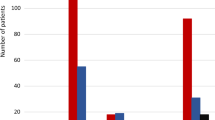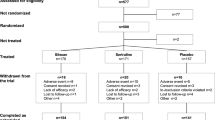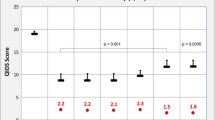Abstract
Objective
This study aims to conduct an evidence review of the effectiveness, harms, and cost-effectiveness of pharmacogenomics-guided antidepressant treatment for major depressive disorder.
Methods
We searched MEDLINE®, the Cochrane Central Registry of Controlled Trials, and PsycINFO through February 2017. We used prespecified criteria to select studies, abstract data, and rate internal validity and strength of the evidence (PROSPERO number CRD42016036358).
Results
We included two randomized trials (RCT), five controlled cohort studies, and six modeling studies of mostly women in their mid-40s with few comorbidities. CNSDose (ABCB1, ABCC1, CYP2C19, CYP2D6, UGT1A1) is the only pharmacogenomics test that significantly improved remission (one additional remitting patient in 12 weeks per three genotyped, 95% CI 1.7 to 3.5) and reduced intolerability in an RCT. ABCB1 genotyping leads to one additional remitting patient in 5 weeks per three genotyped (95% CI 3 to 20), but tolerability was not reported. In an RCT, GeneSight (CYP2D6, CYPC19, CYP1A2, SLC6A4, HTR2A) did not statistically significantly improve remission, and evidence is inconclusive about its tolerability. Evidence is generally low strength because RCTs were few and underpowered. Cost-effectiveness is unclear due to lack of directly observed cost-effectiveness outcomes. We found no studies that evaluated whether pharmacogenomics shortens time to optimal treatment, whether improvements were due to switches to genetically congruent medication, or whether effectiveness varies based on test and patient characteristics.
Conclusions
Certain pharmacogenomics tools show promise of improving short-term remission rates in women in their mid-40s with few comorbidities. But, important evidence limitations preclude recommending their widespread use and indicate a need for further research.


Similar content being viewed by others
References
Agency for Healthcare Research and Quality (2014) Methods guide for effectiveness and comparative effectiveness reviews. AHRQ Publication No. 10(14)-EHC063-EF, Rockville
Alagoz O, Durham D, Kasirajan K (2016) Cost-effectiveness of one-time genetic testing to minimize lifetime adverse drug reactions. Pharmacogenomics J 16:129–136
Altar CA, Carhart J, Allen JD, Hall-Flavin D, Winner J, Dechairo B (2015) Clinical utility of combinatorial pharmacogenomics-guided antidepressant therapy: evidence from three clinical studies. Mol Neuropsychiatry 1:145–155
American Psychiatric Association (2010) Practice guideline for the treatment of patients with major depressive disorder. Am Psychiatric Assoc
Bauer M, Pfennig A, Severus E, Whybrow PC, Angst J, Möller H-J (2013) World Federation of Societies of Biological Psychiatry (WFSBP) guidelines for biological treatment of unipolar depressive disorders, part 1: update 2013 on the acute and continuation treatment of unipolar depressive disorders. World J Biol Psychiatry 14:334–385
Bauer M, Whybrow PC, Angst J, Versiani M, Möller H-J (2015) World Federation of Societies of Biological Psychiatry (WFSBP) guidelines for biological treatment of unipolar depressive disorders, part 2: maintenance treatment of major depressive disorder - update 2015. World J Biol Psychiatry 16:76–95
Berkman ND, Lohr KN, Ansari M et al. (2013) Grading the strength of a body of evidence when assessing health care interventions for the effective health care program of the agency for healthcare research and quality: an update methods guide for effectiveness and comparative effectiveness reviews
Berm EJ, Looff M, Wilffert B, Boersma C, Annemans L, Vegter S, Boven JF, Postma MJ (2016) Economic evaluations of pharmacogenetic and pharmacogenomic screening tests: a systematic review. Second update of the literature. PLoS One 11:e0146262
Bousman CA, Hopwood M (2016) Commercial pharmacogenetic-based decision-support tools in psychiatry. The Lancet Psychiatry
Breitenstein B, Scheuer S, Pfister H, Uhr M, Lucae S, Holsboer F, Ising M, Bruckl TM (2014) The clinical application of ABCB1 genotyping in antidepressant treatment: a pilot study. Cns Spectrums 19:165–175
Breitenstein B, Scheuer S, Bruckl TM, Meyer J, Ising M, Uhr M, Holsboer F (2016) Association of ABCB1 gene variants, plasma antidepressant concentration, and treatment response: results from a randomized clinical study. J Psychiatr Res 73:86–95
Brennan FX, Gardner KR, Lombard J et al. (2015) A naturalistic study of the effectiveness of pharmacogenetic testing to guide treatment in psychiatric patients with mood and anxiety disorders. The primary care companion for CNS disorders 17
Centers for Disease Control and Prevention, National Office of Public Health Genomics. 2007. ACCE model process for evaluating genetic tests [online]. Available: http://www.cdc.gov/genomics/gtesting/ACCE/index.htm [Accessed March 2016]
de Leon J (2016) Pharmacogenetic tests in psychiatry: from fear to failure to hype. J Clin Psychopharmacol 36:299–304
Department of Veterans Affairs: The Management of MDD Working Group (2016) VA/DoD clinical practice guideline for the management of major depressive disorder
Drozda K, Müller DJ, Bishop JR (2014) Pharmacogenomic testing for neuropsychiatric drugs: current status of drug labeling, guidelines for using genetic information, and test options. Pharmacother: J Hum Pharmacol Drug Ther 34:166–184
ECRI Institute (2015a) GeneSight psychotropic pharmacogenomic testing (Assurex Health, Inc.) for guiding medication selection for patients with neuropsychiatric disorders. Genetic Test Product Brief
ECRI Institute (2015b) Pharmacogenetic testing to guide treatment of behavioral and mental health disorders. Genetic Test Hotline Response
Effective Practice and Organization of Care (2013) What study designs should be included in an EPOC review? EPOC Resources for review authors
Elliott LS, Henderson JC, Neradilek MB, Moyer NA, Ashcraft KC, Thirumaran RK (2017) Clinical impact of pharmacogenetic profiling with a clinical decision support tool in polypharmacy home health patients: a prospective pilot randomized controlled trial. PLoS One 12:e0170905
Fagerness J, Fonseca E, Hess GP, Scott R, Gardner KR, Koffler M, Fava M, Perlis R, Brennan FX, Lombard J (2014) Pharmacogenetic-guided psychiatric intervention associated with increased adherence and cost savings. Am J Manag Care 20:e146–e156
Fu R, Gartlehner G, Grant M et al. (2010) Chapter 12. Conducting quantitative synthesis when comparing medical interventions. Methods guide for effectiveness and comparative effectiveness reviews. Agency for Healthcare Research and Quality
Hall-Flavin DK, Winner JG, Allen JD, Jordan JJ, Nesheim RS, Snyder KA, Drews MS, Eisterhold LL, Biernacka JM, Mrazek DA (2012) Using a pharmacogenomic algorithm to guide the treatment of depression. Transl Psychiatry 2:e172
Hall-Flavin DK, Winner JG, Allen JD, Carhart JM, Proctor B, Snyder KA, Drews MS, Eisterhold LL, Geske J, Mrazek DA (2013) Utility of integrated pharmacogenomic testing to support the treatment of major depressive disorder in a psychiatric outpatient setting. Pharmacogenet Genomics 23:535–548
Hamilton SP (1960) A rating scale for depression. J Neurol Neurosurg Psychiatry 23:56–62
Higgins J, Green S (2011) Cochrane handbook for systematic reviews of interventions. Version 5.1.0.
Hornberger J, Li Q, Quinn B (2015) Cost-effectiveness of combinatorial pharmacogenomic testing for treatment-resistant major depressive disorder patients. Am J Manag Care 21:e357–e365
Howland RH (2014a) Pharmacogenetic testing in psychiatry: not (quite) ready for primetime. J Psychosoc Nurs Ment Health Serv 52:13–16
Howland RH (2014b) Pharmacogenetic testing in psychiatry: not (quite) ready for primetime. J Psychosoc Nurs Ment Health Serv 52:13–16
Jonas DE, Wilt TJ, Taylor BC, Wilkins TM, Matchar DB (2012) Challenges in and principles for conducting systematic reviews of genetic tests used as predictive indicators. J Gen Intern Med 27:83–93
Marseille E, Larson B, Kazi DS, Kahn JG, Rosen S (2015) Thresholds for the cost–effectiveness of interventions: alternative approaches. Bull World Health Organ 93:118–124
Matchar DB, Thakur ME, Grossman I et al. (2007) Testing for cytochrome P450 polymorphisms in adults with non-psychotic depression treated with selective serotonin reuptake inhibitors (SSRIs)
McDonagh M, Jonas D, Gartlehner G, Little A, Peterson K, Carson S, Gibson M, Helfand M (2012) Methods for the drug effectiveness review project. BMC Med Res Methodol 12:1
McDonagh M, Peterson K, Raina P et al. (2014) Methods guide for effectiveness and comparative effectiveness reviews: chapter 7: avoiding bias in selecting studies. Agency for Healthcare Research and Quality
Müller DJ, Kekin I, Kao AC, Brandl EJ (2013) Towards the implementation of CYP2D6 and CYP2C19 genotypes in clinical practice: update and report from a pharmacogenetic service clinic. Int Rev Psychiatry 25:554–571
National Institute for Health and Care Excellence (2009) Depression in adults: recognition and management
Norris S, Atkins D, Bruening W et al. (2010) Chapter 8. Selecting observational studies for comparing medical interventions. Methods guide for effectiveness and comparative effectiveness reviews. Agency for Healthcare Research and Quality
Olgiati P, Bajo E, Bigelli M, De Ronchi D, Serretti A (2012) Should pharmacogenetics be incorporated in major depression treatment? Economic evaluation in high- and middle-income European countries. Prog Neuro-Psychopharmacol Biol Psychiatry 36:147–154
Perlis RH, Patrick A, Smoller JW, Wang PS (2009) When is pharmacogenetic testing for antidepressant response ready for the clinic? A cost-effectiveness analysis based on data from the STAR D study. Neuropsychopharmacology 34:2227–2236
Peterson K, Dieperink E, Ferguson L et al. (2016) Evidence brief: the comparative effectiveness, harms, and cost-effectiveness of pharmacogenomic testing guided versus unguided antidepressant treatment for major depressive disorder
Prainsack B, Wolinsky H (2010) Direct-to-consumer genome testing: opportunities for pharmacogenomics research? Pharmacogenomics 11:651–655
Pyne, J (2009) Genetic testing decision analysis model for antidepressant treatment
Rosenblat, JD, Lee, Y, McIntyre, RS (2017) Does pharmacogenomic testing improve clinical outcomes for major depressive disorder? A systematic review of clinical trials and cost-effectiveness studies. J Clin Psychiatry
Rost K, Nutting P, Smith JL, Elliott CE, Dickinson M (2002) Managing depression as a chronic disease: a randomised trial of ongoing treatment in primary care. BMJ 325:934
Rush AJ, Trivedi M, Carmody TJ, Biggs MM, Shores-Wilson K, Ibrahim H, Crismon ML (2004) One-year clinical outcomes of depressed public sector outpatients: a benchmark for subsequent studies. Biol Psychiatry 56:46–53
Serretti A, Olgiati P, Bajo E, Bigelli M, De Ronchi D (2011) A model to incorporate genetic testing (5-HTTLPR) in pharmacological treatment of major depressive disorders. World J Biol Psychiatry 12:501–515
Singh AB (2015) Improved antidepressant remission in major depression via a pharmacokinetic pathway polygene pharmacogenetic report. Clin Psychopharmacol Neurosci 13:150–156
Singh AB, Bousman CA, Ng C, Berk M (2014) Antidepressant pharmacogenetics. Curr Opin Psychiatry 27:43–51
Squassina A, Manchia M, Manolopoulos VG, Artac M, Lappa-Manakou C, Karkabouna S, Mitropoulos K, Zompo MD, Patrinos GP (2010) Realities and expectations of pharmacogenomics and personalized medicine: impact of translating genetic knowledge into clinical practice. Pharmacogenomics 11:1149–1167
Tansey KE, Guipponi M, Hu X, Domenici E, Lewis G, Malafosse A, Wendland JR, Lewis CM, McGuffin P, Uher R (2013) Contribution of common genetic variants to antidepressant response. Biol Psychiatry 73:679–682
Trivedi MH, Rush AJ, Wisniewski SR, Nierenberg AA, Warden D, Ritz L, Norquist G, Howland RH, Lebowitz B, McGrath PJ, Shores-Wilson K, Biggs MM, Balasubramani GK, Fava M (2006) Evaluation of outcomes with citalopram for depression using measurement-based care in STAR* D: implications for clinical practice. Am J Psychiatr 163:28–40
Ubel PA, Hirth RA, Chernew ME, Fendrick AM (2003) What is the price of life and why doesn’t it increase at the rate of inflation? Arch Intern Med 163:1637–1641
Viswanathan, M, Ansari, M, Berkman, ND et al. (2012) Assessing the risk of bias of individual studies in systematic reviews of health care interventions:methods guide for comparative effectiveness reviews, Rockville, MD
Winner JG, Carhart JM, Altar CA, Allen JD, Dechairo BM (2013) A prospective, randomized, double-blind study assessing the clinical impact of integrated pharmacogenomic testing for major depressive disorder. Discov Med 16:219–227
Winner, JG, Carhart, JM, Altar, CA et al. (2015) Combinatorial pharmacogenomic guidance for psychiatric medications reduces overall pharmacy costs in a 1 year prospective evaluation. Current medical research and opinion
Acknowledgements
We would like to thank Julia Haskin, MA, for editorial support. This material is based upon work supported by the Department of Veterans Affairs, Veterans Health Administration, Office of Research and Development, Quality Enhancement Research Initiative (QUERI), Evidence-Based Synthesis Program (ESP).
Author information
Authors and Affiliations
Corresponding author
Ethics declarations
Conflict of interest
The authors declare that they have no conflict of interest.
Rights and permissions
About this article
Cite this article
Peterson, K., Dieperink, E., Anderson, J. et al. Rapid evidence review of the comparative effectiveness, harms, and cost-effectiveness of pharmacogenomics-guided antidepressant treatment versus usual care for major depressive disorder. Psychopharmacology 234, 1649–1661 (2017). https://doi.org/10.1007/s00213-017-4622-9
Received:
Accepted:
Published:
Issue Date:
DOI: https://doi.org/10.1007/s00213-017-4622-9




